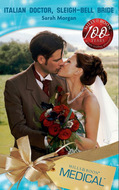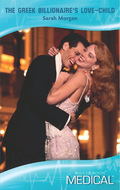Książki nie można pobrać jako pliku, ale można ją czytać w naszej aplikacji lub online na stronie.
Czytaj książkę: «A Very Special Need»

A Very Special Need
Caroline Anderson
MILLS & BOON
Before you start reading, why not sign up?
Thank you for downloading this Mills & Boon book. If you want to hear about exclusive discounts, special offers and competitions, sign up to our email newsletter today!
Or simply visit
Mills & Boon emails are completely free to receive and you can unsubscribe at any time via the link in any email we send you.
Table of Contents
Cover
Title Page
Chapter One
Chapter Two
Chapter Three
Chapter Four
Chapter Five
Chapter Six
Chapter Seven
Chapter Eight
Chapter Nine
Chapter Ten
Chapter Eleven
Epilogue
Copyright
CHAPTER ONE
‘HAPPY birthday.’
‘Thanks.’
‘Thirty today and still looking as good as ever.’
Judith gave her reflection a jaundiced sneer. ‘You’re biased,’ she told it. ‘And a lousy liar.’
The reflection sneered back—the little snub nose wrinkling, the eyes unflinching—taking inventory with no holds barred. They scanned the skin, pale under the superficial light tan of summer, and the eyes smudged with shadows of worry and fatigue—the laughter lines unused in recent weeks. Hmm, she thought. The bone structure was all right, but the top dressing lacked a certain sparkle, and the hair today was definitely mouse brown.
The eyes scanned down her body over the soft curves that despite the scrimped diet failed to disappear, assessing the charity shop clothes—the clever buys that managed to look almost reasonable if not at the cutting edge of fashion—then back up, meeting themselves with relentless honesty.
‘OK,’ the reflection conceeded. ‘So you’re looking thirty today. And tired. And jaded, and dissatisfied with your lot. And you’ve got a white hair—see it there, sticking out?’
She turned away from the unblinking grey lasers. She didn’t need that much honesty, even from herself—and especially not today.
Thirty, she thought, and what had she got to show for it? She looked round the living room of the small flat, at the furniture that, like her, looked tired and jaded and dissatisfied. A rented home, second-hand furniture, Oxfam clothes, temporary work in the term time to keep them ticking over—she had nothing to show for her thirty years at all.
There was a shuffling, bumping noise in the hall.
No. Not nothing, she amended. She had Edward—and she hadn’t even managed to do that right.
She turned a bright smile to the door as it swung open. ‘All ready?’
He nodded, slowly and deliberately, and his mouth twisted into a parody of a smile. His eyes went from her to the mirror just beside her. ‘Looking for the wrinkles?’ he teased in his halting, reluctant speech.
‘Cheeky monkey,’ she said with a grin, and went over and hugged him. ‘All ready for school?’
‘I suppose so.’
She eyed him worriedly. ‘Want to talk about it?’
He shrugged, a slow, deliberate shrug that matched his other movements. ‘New kids—nothing I can’t handle.’
New kids looking at him, wondering what was wrong with him, calling him ‘Spaz’ and laughing at his hesitant speech and awkward gait. The first day of the new school year was always the same. A wave of maternal protectiveness almost swamped her, but she crushed it back down ruthlessly. He didn’t need her pity.
‘You’ll be fine,’ she assured him briskly. ‘They’ll soon get used to you and they won’t think anything of it in a week or so—less if they join the chess club.’
He grinned, his courage as always bringing tears very close to the surface. She turned away and gathered up her bag and a light jacket against the chilly September wind, and blinked hard.
‘Let’s go, then,’ she said, turning back with her smile firmly in place again. ‘And tonight we’ll have a treat and go out for a pizza.’
‘Can we afford it?’ he asked with a shrewd wisdom well ahead of his thirteen years.
She punched his arm gently. ‘Hey, you let me worry about that. It’s my birthday—we ought to celebrate.’
‘Yeah.’ His smile was sad, and he shifted his school bag on his shoulder and turned, picking up his sticks from by the door. ‘Let’s hit the road, then.’
They walked down the path and turned left, coming out within a minute or so onto the road along which the bus ran. There was a crowd of youngsters gathered at the stop, and she could feel the tension pouring off him as he braced himself and walked towards them.
‘See you, Mum,’ he mumbled, and she made herself hang back and watch from a distance as he joined the group.
A black boy separated from the crowd, tall and gangling in baggy jeans, his head completely shaved. ‘Yo, Woody, how you doin’, man?’ he yelled and gave her son a high five, then flung an arm around his shoulders and dragged him into the crowd.
She grinned to herself and turned away. He’d be all right now. Al would take care of him. Al’s baby sister had cerebral palsy, too—the double disadvantage of being black and disabled. Al understood Woody—and Al was a good kid with a heart of gold, even if his hairstyle made Judith flinch. Yes, he’d take care of her son.
And who would take care of her? She stifled a sigh, tugged her jacket closer against the wind and walked briskly towards town and the job centre. Term time meant finding a job to hold body and soul together—and she’d have to find one or there was no way she dared to take Woody out tonight for a pizza, or it might be the last meal they ate for a long, long while.
‘So, how was it?’
He shrugged. ‘OK. I’ve got Mr Greenhill for Maths.’
Her eyebrows shot up and pride surged in her chest. ‘Really? Well done.’
She watched as he pulled off another slice of pizza and wrapped his tongue round the trails of stretchy cheese, hooking it into his mouth with conscious deliberation.
‘It’s no big deal. I can do the work easily.’
She smiled. ‘I know.’
He pushed the pizza towards her. ‘Here. You’ve only had one bit.’
‘I’m not hungry,’ she lied. ‘You eat it.’
He put the slice down and met her grey eyes with his blue ones. ‘Did you get a job?’
She swallowed the fear that seemed to grow ever larger in her chest. ‘Uh—not today. They’ve got another one or two they’re looking into for me,’ she lied, and wondered if her thirties were going to be remembered for the number and range of lies she was to tell her son.
‘Something will turn up,’ she promised him, and to take the worry out of his eyes she picked up the slice of pizza she’d meant to save for her lunch tomorrow and ate it. As it was they had bought one from the supermarket to save money rather than go to the Pizza Hut, and she’d only done that because she’d promised him pizza and the fresh ones from the supermarket were nearly as nice and not quite as expensive.
Tomorrow would be sausages or mince or fish fingers as usual.
Please, God, she thought, let me find a job.
‘How about a game of chess?’ she suggested brightly.
Woody eyed her sceptically. ‘Does that mean I have to let you win because it’s your birthday?’
‘Cheeky monkey. I might beat you anyway.’
He grinned, lopsided and teasing. ‘Yeah. After all, there’s always room in the world for another miracle.’
She chuckled, cleared away the pizza plates and put the chess board on the table. ‘Right, you, do your worst,’ she challenged, and wondered, if there was a spare miracle lying around, whether it could please be dedicated to her finding a job and not thrashing her cocky son at chess…
Nothing was ever easy. There was no job, neither the next day nor the one afterwards, and on the Thursday evening Woody was late back from the bus. She was walking down the path to investigate when he came into view, walking even more awkwardly and his face twisted with pain.
‘Woody? Whatever’s wrong?’ she asked, running the last few steps towards him.
‘I fell,’ he said tersely. He looked withdrawn and mutinous, and she could tell he was suffering.
‘OK. Let’s get you in and inspect the damage. I want to hear all about it.’
‘I’m fine, I just fell,’ he repeated, limping painfully up the little step to their front door.
Judith doubted that he ‘just’ fell. Oh, he did sometimes genuinely fall, of course. She knew that. She also knew that look on his face, that stubborn, determined look which overtook him when someone had cut him to the bone—just as she knew that there was more to this than a simple fall, but she could do nothing.
To interfere and fuss would simply make it worse.
‘Cup of tea?’ she offered, allowing him to deal with it in his way.
‘Mmm, please.’ He sat at the kitchen table, a muffled groan escaping from his tightly closed mouth, and she shut her eyes and counted to ten.
She put the mug down in front of him. ‘Here. Drink this while I run you a hot bath,’ she said softly, and went out before she gave in to the urge to cry her eyes out.
He didn’t deserve this—whatever ‘this’ was. Life was tough enough without some bully going for him. She wondered if he would ever tell her what had really happened.
He wouldn’t let her help him with the bath. That didn’t surprise her. He’d been independent in that department for some years now, struggling to cope alone while she metaphorically bit her nails on the other side of the door.
This time, though, he was ages and she could hear the groans from the kitchen.
There was a time for his pride, she decided, and a time when she just had to be a mother.
She waited until he had gone into his bedroom, then knocked on the door.
‘What?’ he growled.
‘Edward, I want to come in.’
The door opened to reveal her son, clad only in a pair of briefs and some colourful bruises. ‘Why do you always call me Edward when you want to pull rank?’ he said mildly, and turned away.
She swallowed a retort and studied his body. Thin, a little twisted, never moving smoothly, it was even more stiff and jerky than usual tonight. She ran her practised eye over him, looking for strains and stresses, and her eyes settled on his spine.
‘Have you put your back out, falling?’
He nodded. ‘I’ll live.’
‘I don’t doubt it. Where did you fall?’ She tried to keep the edge of irony out of her voice but failed.
‘On the stairs,’ he told her defiantly. ‘I tripped over my foot.’
Plausible but not the truth. Her son could never lie to her, she knew him far too well. Sure, he’d tripped over a foot, but whose? ‘I’ll bring you some ibuprofen tablets.’
‘I’ll come. I’ve got homework to do,’ he told her, and followed her a few painful minutes later, dressed in a baggy tracksuit which hung on his gaunt frame. Heavens, he was getting so tall now…
‘How about your physio?’ she suggested, wondering if that would give her an opportunity to find out how hurt he really was.
‘I don’t think so. Not tonight. Perhaps tomorrow.’
It must be bad, she thought. Painful as his physio was, he never shirked the chore they had shared each evening for so many years.
She went in to his room to tuck him up and turn off his light at ten. He was asleep, his lashes black against the pale, drawn cheeks. He looked so fragile. She brushed the thick dark hair away from his brow and dropped a kiss on his cheek, surprised yet again at the fine dark fuzz that covered his jaw. He would need to start shaving soon, she realised with a shock.
He was growing up so fast. Up and out and away from her, his battle for independence every bit as fierce as any other teenager’s, only the other kids didn’t have to deal with disability as well.
‘I love you,’ she whispered soundlessly. ‘Please don’t be hurt.’
In the morning he could hardly walk. Knowing his courage and knowing from her own experience that bad backs were best treated by specialists, she sent him back to bed and left the flat.
In the next street, just a few hundred yards away, there was an osteopath. As well as being so convenient for her home, he had also established an excellent reputation. She had heard his name at several clinics and support group meetings, and she understood he treated lots of children with cerebral palsy and other disabilities. Not that she could afford any treatment, more’s the pity. No, but she would go and ask his advice. Hopefully it would be free.
It was a strange area, she thought as she set off. Their flat was a maisonette, the lower half of a conventional-looking two storey house in a little street with several similar ones, drab and ordinary but functional. Aesthetic appeal seemed to have passed it by, and yet round the corner the next street was altogether grander, the houses imposing Victorian double fronted status symbols, very des-res and so far out of her reach that she hardly even dared to imagine what they were like inside.
At the entrance to one of them she hesitated, looking up at the impressive red-brick façade, at the large bay windows and ornate stone lintels and the immaculate garden with shrubs and perennials creeping onto the tarmacked drive in carefully orchestrated profusion.
It was gorgeous—and intimidating. It was also the home and workplace of the man she wanted to talk to. Mentally girding her loins, she walked up the driveway, past the cars parked at the front, and found the outer door propped open. Beyond the glass door into the hall she saw a reception desk ahead of her, a beautiful walnut desk with the glorious patina of age. It was probably worth more than her entire flat contents.
Her heart sank. This man was weathly and successful. Why should he help her? She was about to turn tail and run when the receptionist, a woman of about Judith’s own age, looked up and smiled through the glass, and beckoned her in.
She went. It would have been impossibly rude not to have done so, and she dredged up an answering smile.
‘Good morning,’ the receptionist said as she approached. ‘Can I help you?’
Where to start? How about the obvious? she thought. ‘My name’s Judith Wright. I wonder if it would be possible for me to have a word with Mr Barber about my son.’
‘Is he a new patient?’ the woman asked, turning to a card index on the desk. Judith noticed that she was very pregnant. His wife?
‘No. Well, that is, he isn’t a patient—not yet. That was what I wanted to discuss,’ she lied boldly.
The woman smiled. ‘I see. If you’d like to take a seat, Mrs Wright, I’ll have a word with him in a few minutes in between patients.’
She didn’t bother to correct the mistake. She was so used to being called Mrs Wright that she ignored it now. Returning the smile, Judith went through the door indicated and found herself in a waiting room overlooking the front. It was light, airy and welcoming—and most of the chairs were upright, wooden armchairs, ideal for people with bad backs, she thought with a slight smile. She armed herself with a magazine and sat in one of the chairs. There were two other people in there, a man and a woman sitting on opposite sides of the room, their noses buried in magazines.
She looked round the elegant, high-ceilinged room with the ornate plaster cornice and beautiful marble fireplace with a lovely iron and tiled centre. It was a wonderful room, she thought. The decor was subdued but effective, soft smoky green colour-washing below the dado rail and a very traditional stripe above, with the green echoed on the ceiling and the plasterwork picked out in off-white. The muted brick tones of the carpet warmed the scheme and gave it colour, reflected in the curtain fabric and the tiles of the fireplace. Very clever. Very effective. Very restful. She wondered who had chosen the scheme. His wife? The receptionist?
No. Probably a fancy interior designer who had been paid a fortune. She glanced at her watch and wondered how long she would have to wait. Ten minutes? Fifteen? Perhaps until both of these patients had been treated—if he would even see her then—
‘Mrs Wright?’
She looked up—straight into a pair of the most startlingly blue eyes she had ever seen—and felt a jolt of something that rocked her to the core.
Lightning? If she hadn’t felt so shaken by it, she might have laughed. She didn’t laugh, though. She couldn’t. She stood up, pulled to her feet by the power of those astonishing eyes, and crossed the room, dropping the magazine absently on the table as she passed it.
‘Hugh Barber,’ he said by way of introduction, and held out his hand. She took it, her own engulfed by the powerful fingers in a firm and yet gentle handshake. Their palms met briefly, and she dropped his hand at once, shocked by the searing heat. No, not heat. Warmth, and something else—something big and strong and comforting that made her want to bury her head against that solid chest just in front of her eyes and give in to all the anguish and worry and torment of the past fourteen years.
She didn’t, though. By a miracle she managed to avoid hurling herself into his unsuspecting arms and went through the door he indicated. The room was the mirror image of the one she had just been in, the colours a similar soft, muted green and cream, designed for relaxing in.
Judith didn’t feel relaxed. She was about to do something she hated doing, and she could feel the tension coiled in her like a watchspring. He waved her to a chair beside the desk, perched on the treatment couch with one leg dangling and smiled encouragingly at her.
‘I gather you wanted to talk to me about your son,’ he said, and his voice swirled through her like dark chocolate.
She looked down at her hands to avoid those searching, stunning eyes. ‘Yes. He’s had a fall—he says he tripped. He’s got mild cerebral palsy—he is a little clumsy at times, but I think this was deliberate. Whatever, his back’s injured in some way—jarred. I wondered if you could tell me what I should do to help him.’
Of course. I’ll have to see him, obviously. I have a children’s clinic on the other side of town on Tuesdays. Is that any good to you?’
She grimaced slightly. ‘Transport’s difiicult,’ she told him, hoping that would be enough. It wasn’t.
‘I’ll see him here, then, if it’s easier. Have a word with my receptionist and she’ll make you an appointment. I take it you are able to get here?’
‘We only live round the corner, but just at the moment I don’t know that he could walk that far. I’ll have to see,’ she flannelled. ‘If you could just give me some advice initially…’
‘I really should see him to be on the safe side. Have you taken him to the hospital for an X-ray?’
‘Um—no. I’m sure he’s just jarred it. There’s nothing broken.’
‘Then if you could manage to get him in to me—perhaps a taxi?’
Damn. He wasn’t going to just give her advice, that was clear. She swallowed. A taxi was totally out of the question. Al’s mother, Belle, might be able to give them a lift if she wasn’t working, but she was a community midwife and worked strange hours—as well as juggling Al and Flora as a single parent.
No. She couldn’t ask Belle. ‘We’ll manage. We’ve got a wheelchair we can use.’ Judith drew in a steadying breath, lifted her head and met the man’s searching eyes. He seemed to be waiting, as if he knew there was something to follow—something difficult and awkward and embarrassing. She hated what she was going to have to do, but she’d do it for Woody.
‘I haven’t got any money,’ she told him with quiet dignity. ‘I’m hoping to get a job soon for the term. I wondered…’ she swallowed ‘… if you would be able to bill me for the treatment and let me pay you back as I earn the money.’
There. It was said. She held his eyes, resisting the urge to run away, and brazened it out.
Hugh looked deep into the challenging eyes of this gutsy little woman daring him to turn her down, and wondered at the hurdles she’d had to overcome and the struggles she’d had to face.
There was such determination in the jut of her chin and the tilt of her head, such uncertainty deep in those lovely, soft grey eyes. What had she had to cope with? She hadn’t said how old her son was, but he guessed around ten, probably. She looked as if she was in her early thirties—maybe not that old if life had been cruel.
He was sure it had. Life was. His own had been cruel, leaving the indelible marks of grief etched on his face. It didn’t hurt so much now, but it had and the scars showed.
Mrs Wright had scars, too—worry and strain engraved on such soft, fine skin that it seemed a travesty. His fingers ached to soothe away the worry.
That wasn’t all that ached. For the first time in what must be years, he felt attracted to a woman, not only physically but somewhere deeper in the hidden recesses of his subconscious. When he’d touched her he’d felt the most unbelievable warmth flow through his hand. He’d never felt anything like it before. It was more than simple sexual chemistry. It felt almost like—destiny?
Lord, he was going nuts. Anyway, inevitably she was married to the probably undeserving Mr Wright. Hugh wondered if the lucky dog realised just how lucky he was. If not, he wondered if there was some other fortunate ingrate keeping this lovely woman warm at night.
He felt a sharp, shocking twist of something which could only be jealousy. Good grief! What on earth was the matter with him?
Anyway, he’d probably imagined his reaction and, even if not, it was almost certainly not reciprocated.
He curled his fingers over his still-tingling palm and got back to the reason for her visit.
‘How old is your son, Mrs Wright?’
‘Thirteen—and it’s Miss. I’m a single parent.’
He ruthlessly suppressed the urge to whoop with delight. ‘And has he had any back trouble before?’
‘Aches and pains—nothing the physio and I couldn’t keep under control.’
‘And what makes you think he needs to see an osteopath and not a physiotherapist this time?’ Hugh asked, curious about her motives.
‘Experience. I know him, and I know the limitations of physio. I also know about bad backs to an extent. There are times when nothing else works.’
‘And you think this is one of those times?’ Hugh pressed.
‘Yes, I do.’
Even her voice was wonderful. Soft, well modulated, almost a caress. He forced himself to stop fantasising and engaging her in needless conversation, and got to the point.
‘It may take several treatments.’
She swallowed. ‘I know.’
He nodded. ‘OK,’ he murmured. ‘I’m sure we can stagger the payments if that will help you,’ he told her, and was rewarded by the bright glimmer of tears in her eyes before she dropped her head forwards.
‘Thank you,’ she whispered.
He stood up, angry with himself for dragging out her misery and making her justify herself just so he could hear her voice. ‘Have a word with my receptionist—I can probably fit him in at lunchtime today so he doesn’t have to wait over the weekend. I’m sorry, I’m going to have to press on, I’ve got a patient waiting. I’ll see you both later.’
He watched her walk over to Christine, closed his eyes briefly to clear his mind of the sensual image burnt on his retinas and stuck his head round the waiting-room door. ‘Mrs Parker, would you come in, please?’
Woody found even the wheelchair difficult. Sitting was nearly as bad as walking, and by the time they arrived at the lovely red-brick house he was tight-lipped with pain.
He still managed a smile for her, though, as she wheeled him in. Lord, he was a gutsy kid. Judith looked away from him, her eyes bright with tears, and found herself face to face with the man whose image she had been unable to get out of her mind since this morning.
‘Hi,’ he said cheerfully, then hunkered down beside Woody. ‘You must be Edward. Pleased to meet you. I gather you’ve hurt your back?’
Woody mumbled a response, and Judith watched as they shook hands, then Mr Barber looked up at her. ‘I wonder if you’d mind filling in a card with all Edward’s details while we go and have a chat and I have a quick look to see what he’s done to himself?’
He gave her a card, a pen and a wink, and disappeared into his consulting room, pushing her son ahead of him in the wheelchair. She chewed her lip. Should she be in there with him?
She’d been clearly dismissed. Oh, well, perhaps he’d have some joy getting the truth out of him without her hovering about being a fussy mother.
She sat down with the card and obediently filled in all the information.
‘So, Edward, I gather you fell down some stairs, is that right, and now your back hurts?’
The boy nodded slowly. He certainly had quite a bit of spasticity in his muscles, Hugh noted. His handshake had been slow and deliberate but strong, and Hugh knew the hardest part of the treatment would be getting the muscles to relax enough to allow him to work on the spine.
Inevitably after thirteen years there would be some deformity and contracture problems. Just how bad and how insurmountable, he would have to establish. ‘I wonder if you could stand up and let me take a look at you?’ he murmured.
Woody struggled out of the chair, wincing as his back twinged, and Hugh forced himself to stand back and observe. One shoulder was a little higher than the other, indicating a slight scoliosis—a sideways curve to his spine which would be more obvious, of course, without clothes—but basically his posture was better than Hugh had expected.
‘OK. If you could just slip off your clothes down to your pants I’ll go and see how your mother’s getting on. Do you want her to join us?’
The boy shrugged, a slow, deliberate shrug, his face expressionless.
‘I think we can probably manage without her, don’t you? I’ll give her a cup of tea and we can get started.’
He left the lad undressing and went to find Judith. She was sitting in the waiting room with her head bent forwards, resting on a book on her knee while she filled in the record card. Her bottom lip was caught between small, even white teeth in an endearing little gesture that tugged at something inside him. The sun caught her hair, gleaming off the red-gold lights in it, and he had to fight against the urge to pull the band off the back and tunnel his fingers through it, fanning it out over her shoulders and spreading it across the crisp white pillow—
He yanked himself up short, shocked by the unruly direction of his thoughts, and cleared his throat. She looked up, straight into his eyes, and he had the sudden ghastly feeling that she could read his sordid mind. ‘Ah—how are you doing?’ he asked, conscious of the slow crawl of heat up the back of his neck.
‘All done,’ she replied, her voice soft and husky and unbelievably sexy. ‘I was just checking it.’
‘Good.’ He cleared his throat again and took the card from her outstretched hand, carefully avoiding touching her. ‘Look, I think your son might appreciate it if I treat him without you there?’ He phrased it almost as a question, to give her the chance to discuss it, but to his relief she nodded.
‘I rather thought you wanted to. Perhaps you’ll be able to find out what really happened.’
‘That’s what I was thinking,’ he told her honestly. Obviously he doesn’t want you to know the truth because he doesn’t want you hurt by it, and he knows you would be.’
Her smile nearly blew a fuse in his mind. ‘I’m so glad you understand,’ she said fervently. ‘They’re so convoluted, kids.’
He grinned at her. ‘I make an art form of understanding teenage boys—I’ve got one of my own. Look, I tell you what, you sit here and have a cup of tea while I get to grips with Edward. OK?’
She looked astonished, her eyes wide and soft and grateful. ‘Um—fine. Thank you.’
‘How do you take your tea?’
‘White, no sugar.’
‘Right.’ He escaped, almost running down the hall to the kitchen. Christine was sitting on the sofa with her feet up, resting her hands on the smooth swell of her pregnancy.
‘Hi. Any tea in the pot for Miss Wright?’
‘Should be. Hugh, my back’s giving me hell—I don’t suppose you could have a go at it, could you? It’s been dodgy all day again.’
He looked across at her. She seemed pinched, a bit tired. Hell. He really must find another receptionist so she could start her maternity leave—
‘I’ll just get this kid out of the way and I’ll have a look at you then, I promise. You stay here and take it easy for a few minutes—get some shut-eye. Oh, and while I think about it, Edward Wright’s bill is going to be staggered and I’m going to tell her I charge half-price for children under sixteen.’
Christine managed a wan smile. ‘Softy,’ she murmured.
He grinned. ‘That’s me. Just a sucker for a sob-story. Rest now. I won’t be long.’
She nodded, and he took the tea back to the waiting room and handed it to Edward’s mother. ‘Here—one cup of tea, white, no sugar.’
‘Thanks.’ She flashed that dazzling smile at him again, and he had to swallow hard and dredge in a great lungful of air before he could make his legs work again. How his system could have gone from years of near-coma to absolute screaming wakefulness in such a short time, he didn’t know, but it certainly had.
He shook his head to clear it, went back into his consulting room and shut the door. There, propped against the edge of the couch in some pain, was the reason this beautiful woman had come into his life—the only reason, he reminded himself—and he would do well to remember it.
‘Right, Edward, let’s see what we can do for you,’ he said briskly, and banished his intrusive libido from his thoughts.
Darmowy fragment się skończył.









